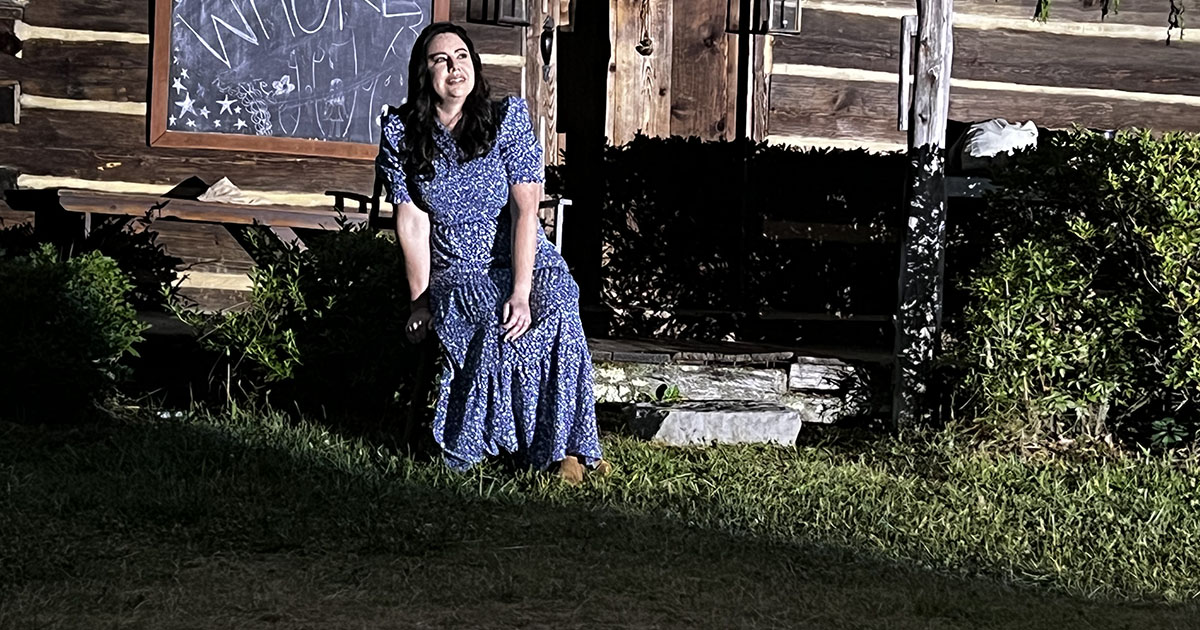There is an ineffable sense of magic in theatre that is performed outdoors, particularly when accomplished at twilight in a natural setting as the fading light and ambient sounds of nighttime take hold. Marble City Opera has taken advantage of this magic in its immensely effective and touching outdoor production of Susannah, the 1955 opera by Carlisle Floyd. The location for the production was the atmospheric Marble Springs State Historic Site in South Knox County, a site that was the last home and farm of John Sevier, Tennessee’s first governor. [**See note below]
Based on the apocryphal story “Susannah and the Elders,” Susannah has been one of the most-produced American operas since its premiere, delighting many and mystifying others over the years. Floyd’s score is intriguing, evocative, and folksy, albeit without serious complexity; his libretto, a cleanly adapted version with a 1950s allegorical slant, moved the story and its vernacular to a small mountain town in East Tennessee, New Hope Valley. It is that setting which the natural layout of cabins and fields at Marble Springs was able to suggest to an atmospheric degree. Although other MCO productions have immersed the audience in the action, this Susannah takes that concept of immersion to an even greater level—the church revival scene, for example, places performers and audience members literally side by side.
Making use of the last rays of sun and the “golden hour,” director Matthew Haney has the action—plus the excellent 22-member orchestra led by conductor Andy Anderson, as well as the audience—move between two spots on the site: a pavilion as the town’s church and a pioneer era cabin used as the home of Susannah and her brother Sam, along with other scenes.
In the title role was soprano, and MCO executive artistic director, Kathryn Frady, who excelled beautifully in the two sides of the character: the dramatic passion of a naive, but determined young woman put upon by hypocritical injustice, and the sparkling vocal lyricism through which that passion flows. Her “Ain’t It a Pretty Night” is poignant and optimistic, its clarity and meaning incredibly appropriate in the night air:
“Ain’t it a pretty night
Just think, all those stars can all peep down
An’ see way beyond where we can:
They can see way beyond them mountains
To Nashville and Asheville and Knoxville.”

David Crawford was brilliant as the hypocritical preacher Olin Blitch, in a performance that uses his incredibly rich and powerful bass-baritone as the focal point in the church scene, and in the wrenching dramatic deviousness of his “seduction” of Susannah.
Tenors, too, fared very well in the crisp, diction-supporting night air of Marble Springs. Joseph McBrayer created an eminently likable Sam Polk, Susannah’s brother and housemate, who likes hunting and drinking — probably not in that order. Cody Boling, too, was a vocal standout as Little Bat, a village admirer of Susannah and son of Elder McLean. The clarity of Boling’s voice is remarkable, although defining his character as someone with frenetic autism seemed a bit unnecessary.

Baritone Paul Houghtaling as Elder McLean and Julie Bélanger Roy as Mrs. McLean were beautifully believable as the essence of hypocritical townsfolk, each painting their dramatic countenances with shade and an all-consuming jealousy. Joining them in their hatred of Susannah was Breyon Ewing and Tori Franklin as Elder Hayes and Mrs. Hayes, Maurice Hendricks and Ema Metrovic as Elder Ott and Mrs. Ott, and John Overholt and Sabreena Cherrington as Elder Gleason and Mrs. Gleason.
When one thinks of plays, musicals, and operas that work well in exterior settings, Carlisle Floyd’s Susannah must definitely be in that list. Those that have seen or have been in involved in outdoor drama will immediately recognize the potential; those new to the experience will enjoy the freshness and emotional tug that simply isn’t present in indoor drama and music.
**[In a bit of coincidence, John Sevier was himself the subject of an outdoor historical drama in the late-1950s—Chucky Jack, at Hunter Hills Theatre outside of Gatlinburg, TN. That theatre was later deeded to the University of Tennessee and was operated as an outdoor summer repertory theatre from 1966-1977. ]






